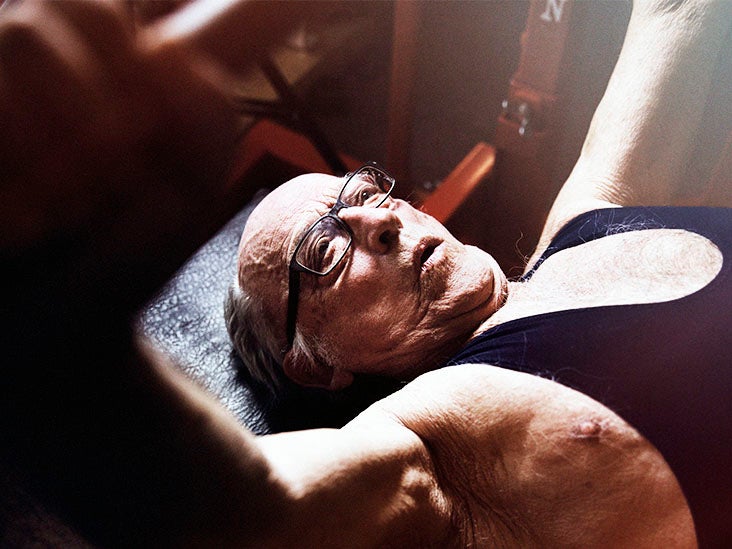Blood
Is high blood pressure in older age normal? What to know
Hypertension, or high blood pressure, is when the pressure in the blood vessels is consistently over a certain threshold. Blood pressure levels can increase with age as the body changes and blood vessels become stiffer.
Blood pressure refers to the force that comes from blood pressing against the walls of the arteries as it pumps through the body. Blood pressure measurements involve two numbers: systolic blood pressure and diastolic blood pressure.
Systolic blood pressure is the pressure within the arteries when the heart beats. Diastolic blood pressure is the pressure within the arteries when the heart pauses between beats.
Read on to learn about high blood pressure in older adults, including what causes it, how to manage it, how often a person should check their blood pressure, and more.
The vascular system changes with age. This can cause blood pressure to rise.
As a result, the chances of having high blood pressure increase with age.
The thresholds for high blood pressure are the same regardless of a person’s age.
According to guidance from the American Heart Association (AHA), the classification for high blood pressure is when either the systolic number is at least 130 millimeters of mercury (mm Hg) or the diastolic number is at least 80 mm Hg.
A blood pressure reading with a systolic number of 130 mm Hg or over often occurs in older adults. However, the diastolic number often remains below 80 mm Hg.
After a certain point, aging causes functions to decline in organs throughout the body. Natural increases in inflammation, oxidative stress, and endothelial dysfunction come together in a process called the “vascular health triad.” This increases the risk of high blood pressure.
Within the system of blood vessels, high blood pressure increases as the arteries become stiff. This means the artery walls do not respond as easily to blood passing through.
Additionally, there are lifestyle risk factors associated with aging. For example, it may become more difficult to get enough physical activity.
The U.K.’s National Health Service (NHS) recommends that people over the age of 40 years see a medical professional to check their blood pressure at least once every 5 years. A doctor can advise on whether they recommend getting more regular checkups based on an individual’s circumstances.
It is also possible to monitor blood pressure at home between appointments using a low cost monitor. When monitoring blood pressure at home, it is best to do so twice per day, ideally in the morning and the evening. Taking two readings each time can help provide a more accurate overview of your blood pressure.
Learn more about monitoring blood pressure at home.
In addition to getting older, other factors can increase the risk of having high blood pressure. These include:
- Sex: People assigned male at birth are more likely to have high blood pressure before the age of 55 years. People assigned female at birth are more likely to have high blood pressure after menopause.
- Genetics: High blood pressure runs in some families.
- Race: African Americans are at a higher risk of high blood pressure.
- Weight: Being overweight can increase a person’s risk of high blood pressure.
- Not getting enough physical activity: The National Institute on Aging recommends aiming for at least 150 minutes of exercise per week.
It is best to contact a doctor for advice if there are concerns about the risk factors for high blood pressure.
It is not possible to prevent high blood pressure completely due to uncontrollable factors, such as age and genetics. People who practice heart-healthy habits can still develop high blood pressure.
However, taking steps to manage blood pressure and regularly monitoring blood pressure can help reduce the risk of hypertension.
Here are some frequently asked questions about high blood pressure in older adults.
What blood pressure is too high for seniors?
Blood pressure guidance does not differ with age. The standard classification comes from the AHA — high blood pressure is when the systolic number is at least 130 mm Hg or the diastolic number is at least 80 mm Hg.
At what age should you worry about high blood pressure?
High blood pressure can affect anybody at any age. Males are more likely to get high blood pressure before the age of 55 years, while it more commonly affects females after menopause.
A person’s doctor can advise on how frequently they should check their blood pressure based on the individual’s own circumstances.
High blood pressure, or hypertension, is when the force of blood passing through the blood vessels is consistently high. Different factors can influence blood pressure, including age. There are several reasons for this, including natural stiffening within the arteries, a general decline of organ function, and difficulty maintaining heart-healthy habits, such as getting regular exercise.
A person can take steps to help manage their blood pressure. This includes consuming a heart-healthy diet, getting enough physical activity, and avoiding consuming alcohol and smoking.
It is best to contact a doctor for advice if there are concerns about high blood pressure. The doctor can advise on ways to manage blood pressure levels.

